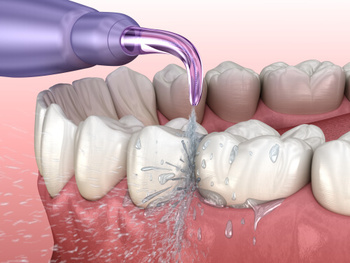Traditional methods like brushing and regular flossing have been long-standing recommendations in the quest for optimal oral health. However, the emergence of water flossers has introduced a novel approach to maintaining dental hygiene. These devices, also known as oral irrigators, employ water to remove food particles and plaque from hard-to-reach areas around the teeth and gum line, potentially offering a more effective solution for those with braces, dental implants, or orthodontic appliances.
This article delves into the critical question: do dentists recommend water flossers? While traditional string flossing has been the cornerstone of good oral health, using a water flosser could significantly advance. Our exploration will cover dentists’ viewpoints on water flossing, its effectiveness compared to standard dental floss, and its role in preventing gum disease and maintaining healthy gums. This discussion aims to provide insights into whether water flossers can be a valuable addition to your dental routine or even replace traditional flossing methods for improved oral health.
Traditional Flossing vs. Water Flossing
The debate between traditional string flossing and water flossing is central to discussions about optimal oral hygiene. Traditional flossing, using standard dental floss or dental tape, has been a long-standing recommendation by most dentists for its effectiveness in removing plaque and food particles between teeth. This method, endorsed by the American Dental Association (ADA), is known for its precision and ability to manually scrape off plaque, thereby reducing the risk of gum disease and promoting gum health.

On the other hand, water flossers, a form of oral irrigators, use a stream of water at varying pressures to clean between teeth and along the gum line. This method is particularly beneficial for those with dental work such as braces, dental implants, or other orthodontic appliances, as it can reach hard-to-clean areas more easily than traditional string floss. Water flossing is also often recommended for those who find regular flossing challenging or have conditions like bleeding gums, where gentle water pressure can be less irritating.
However, while water flossers offer convenience and ease of use, especially for those with orthodontic treatment, they may not be as effective in removing plaque as traditional flossing. Some oral health experts suggest that the mechanical action of traditional flossing is superior for plaque removal, especially along the gum line. As always, talking to your dentist about your specific oral health needs is essential to determine if water flossing can replace or should supplement traditional flossing in your dental routine.
Dentists’ Perspective on Water Flossers
Dental professionals often weigh in on the debate over traditional string flossing versus water flossing, with perspectives varying based on individual oral health needs. Many dentists recommend water flossers as a valuable tool for certain patients, especially those with braces, dental implants, or other orthodontic appliances. Using water pressure to clean between teeth and along the gum line, water flossers can reach hard-to-access areas that traditional floss might miss.
Studies have shown that water flossing can effectively reduce gum disease and maintain gum health. For instance, a study endorsed by the American Dental Association (ADA) noted that individuals using a water flosser with a standard jet tip could experience a more significant reduction in gingival bleeding and plaque removal compared to those using traditional string floss. This is particularly relevant for patients with periodontal disease or those prone to bleeding gums, as water flossing is gentler on the gums.
However, some dentists still advocate for traditional dental floss as part of a comprehensive dental routine, emphasising its effectiveness in mechanically removing plaque and food debris, especially along the gum line. They argue that while water flossers are a good alternative, especially for those with dental work or difficulty using traditional floss, they should only partially replace string flossing for most individuals.
Ultimately, the consensus among dental professionals is that both methods have their benefits. The key is to ensure that whatever method chosen contributes to good oral health. Dentists often suggest talking to your dentist about your specific dental needs and incorporating their recommendations into your daily routine for the best outcomes in oral hygiene.
Impact on Oral Health and Lifestyle
Introducing water flossers into daily dental routines has significantly impacted individuals’ oral health and lifestyle. Many users report noticeable improvements in gum health, particularly those suffering from gum disease or sensitive gums. The gentle water pressure of the oral irrigator effectively cleans the gum line and interdental areas, reducing inflammation and bleeding gums, common issues with traditional string flossing. This benefit is especially crucial for those with sensitive oral conditions, where traditional methods can be painful or ineffective.
Water flossers have been a game-changer for people with orthodontic appliances, such as braces. The stream of water easily reaches hard-to-clean areas around wires and brackets that standard dental floss often misses. This ease of cleaning maintains good oral hygiene and prevents periodontal problems associated with orthodontic treatment.
Regarding lifestyle changes, users praise the water flosser for its convenience and time efficiency. Unlike traditional flossing, which can be time-consuming and requires a certain technique, water flossing is straightforward and can be integrated seamlessly into the daily routine, often taking less time to achieve better results. This aspect particularly appeals to busy individuals or those who find regular flossing cumbersome. Adopting water flossers has improved oral health and a more manageable and enjoyable oral care routine.
Comparisons with Previous Oral Hygiene Practices
When comparing water flossing to previous oral hygiene practices, many users find it superior in several ways. While effective, traditional string flossing often poses challenges such as difficulty reaching back teeth, discomfort for those with sensitive gums, and the inconvenience of handling floss. Water flossers address these issues with their ease of use, effectiveness in reaching hard-to-reach places, and gentle cleaning action.
Users frequently mention the efficacy of water flossers in plaque removal and maintaining teeth clean, especially in comparison to standard dental floss. The water stream effectively dislodges and removes food debris and plaque, contributing to healthier teeth and gums. This is particularly noted by users with dental work, where water flossers outperform traditional floss in cleaning around dental implants or bridges.
Dentists acknowledge several key benefits of water flossing, making it a recommended choice for many patients, especially those with specific dental conditions. One of the primary advantages of using a water flosser often endorsed for its effectiveness, is its ability to reduce gum disease. The stream of water effectively cleans along the gum line and between teeth, where food particles and plaque often accumulate and are hard to reach with traditional string floss.

Water flossers are particularly beneficial for individuals with dental implants, orthodontic appliances, or braces. The water pressure can gently and effectively clean around these dental works without causing damage, which can be challenging with standard dental floss. Moreover, for those who experience bleeding gums, a water flosser can be a gentler alternative to traditional flossing, helping to maintain gum health without the irritation that sometimes occurs with string floss.
Water flossers also improve oral health by effectively removing plaque and reducing inflammation in the mouth. This aspect of water flossing is significant, as plaque removal is crucial in preventing periodontal disease and maintaining healthy gums. Most dentists recommend incorporating water flossing into your daily dental routine, especially if traditional flossing is challenging or insufficient for your dental needs. However, it’s always important to talk to your dentist to understand how a water flosser can specifically benefit your oral hygiene regimen.
Potential Limitations and Considerations
While water flossers benefit many, they also come with certain limitations and considerations. One key drawback noted by dentists is that, despite being effective at flushing out food particles and reducing gum disease, water flossers might not be as efficient as traditional dental floss in removing plaque. The mechanical action of traditional string floss against the teeth and gum line is crucial for dislodging and removing plaque, which water flossers may not replicate completely.
Additionally, using a water flosser requires access to electricity and water, making it less portable than standard dental floss. This can be a limitation for those who travel frequently or prefer a more straightforward dental routine. The cost of a water flosser is also higher than traditional floss, which might be a consideration for some users.
Adjusting to the water pressure can be a challenge for individuals with sensitive gums or those new to water flossing. Talking to your dentist about the appropriate settings to avoid discomfort is important. While water flossers can be a good alternative or supplement to traditional flossing, especially for those with orthodontic treatment or dental implants, they might not completely replace the need for regular string flossing in every case. Dentists often recommend a combination of brushing, flossing, and, where beneficial, using a water flosser for optimal oral health.
How to Choose and Use a Water Flosser
Choosing the right water flosser is key to enhancing your oral hygiene routine. When selecting a water flosser, consider factors like adjustable water pressure, essential for catering to different needs, such as sensitive gums or dental work like implants. Look for models with various tip options, as specialised tips can be more effective for orthodontic treatment or reaching hard-to-clean areas.

When choosing a water flosser, you must make sure that it meets specific effectiveness and safety standards. Portability may be another consideration, especially if you travel frequently. Some water flossers are designed for easy transport, while others are more suited for stationary use.
In terms of usage, start with a lower water pressure and gradually increase it to find a comfortable yet effective setting. Aim the water stream at a 90-degree angle to the gum line, moving along the gum line and between the teeth to effectively remove food particles and plaque. Using the water flosser daily is important, as regular use contributes to improved oral health. As always, talk to your dentist about incorporating water flossing into your dental routine, especially if you have specific oral health concerns like gum disease or are using dental appliances. This personalised advice can help ensure you get the maximum benefits from your water flosser.
Conclusion
In conclusion, this article has explored the various aspects of water flossing, a significant development in oral hygiene. While dentists recommend water flossers for their effectiveness in removing food particles and reducing gum disease, especially for those with dental implants or orthodontic appliances, traditional string flossing remains vital to dental care due to its proven effectiveness in plaque removal. Water flossing can be an excellent addition to your dental routine, contributing to improved oral health and helping maintain healthy gums. However, it’s crucial to consider individual needs and consult a dental professional for personalised advice.
For expert guidance and to explore the best options for your oral health, consider visiting Infinity Dental Care. Their team can provide tailored advice on whether a water flosser suits you and how to incorporate it effectively into your oral care regimen. Contact us at (02) 9159 6237 to schedule a consultation and take a step towards better dental health.
References:
webmd.com/oral-health/what-is-waterpik
verywellhealth.com/is-water-flossing-better-than-string-flossing-4137725
pubmed.ncbi.nlm.nih.gov/25822642/
healthline.com/health/dental-and-oral-health/waterpik-vs-flossing

